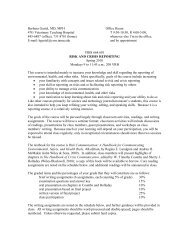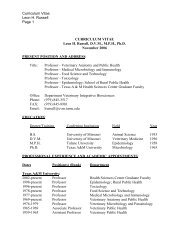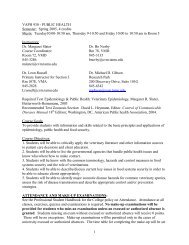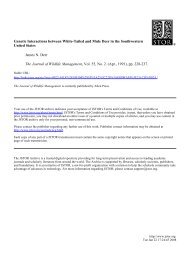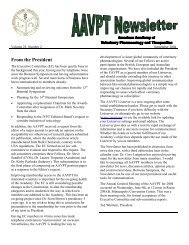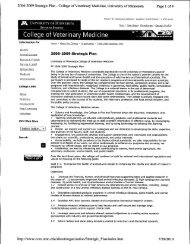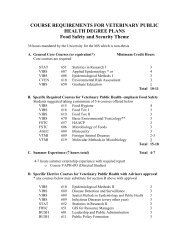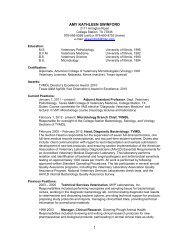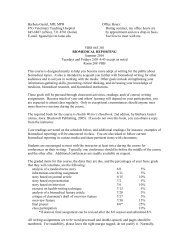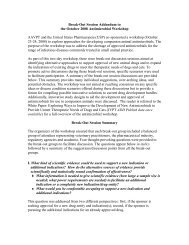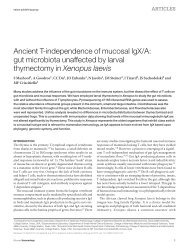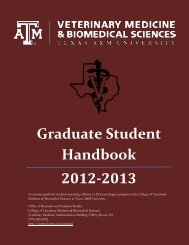(MRSA) - College of Veterinary Medicine - Texas A&M University
(MRSA) - College of Veterinary Medicine - Texas A&M University
(MRSA) - College of Veterinary Medicine - Texas A&M University
You also want an ePaper? Increase the reach of your titles
YUMPU automatically turns print PDFs into web optimized ePapers that Google loves.
My animal<br />
has <strong>MRSA</strong>, how can I<br />
avoid becoming infected?<br />
• Follow your veterinarian’s<br />
instructions.<br />
• Use good hand hygiene (handwashing<br />
or alcohol hand sanitizer) before and<br />
after contact with the infected animal.<br />
• Use gloves when handling or in<br />
contact with any blood or body fluid or<br />
when caring for wounds.<br />
• Keep open wounds covered.<br />
• Clean and disinfect items and surfaces<br />
that had contact with the infected<br />
animal using an EPA product (EPA<br />
number will be on the label) effective<br />
against <strong>MRSA</strong> following the directions<br />
on the label or with a bleach solution (1<br />
tablespoon to 1 quart <strong>of</strong> water).<br />
• Wash any items that become soiled<br />
by the animal separately from the other<br />
laundry, using hot water and laundry<br />
detergent (and bleach if possible). Dry<br />
in a dryer on hot. This will help kill the<br />
bacteria.<br />
• Anyone in your household that is<br />
immunocompromised, has recently<br />
had surgery, is very young, or is elderly<br />
should avoid contact with the infected<br />
animal or items soiled by the animal.<br />
Contact your physician for more<br />
information.<br />
What<br />
should I do if I have<br />
signs <strong>of</strong> an infection?<br />
Contact your physician if you notice a<br />
boil or area that is red and swollen or<br />
looks like a “spider bite” or if you have<br />
any other signs <strong>of</strong> infection.<br />
For more information,<br />
please visit these web sites:<br />
<strong>Texas</strong> Department <strong>of</strong> State Health Services<br />
www.dshs.state.tx.us<br />
Centers for Disease Control<br />
www.cdc.gov<br />
Kit Darling, MS, CIC, M, MT (ASCP)<br />
Infection Prevention Coordinator<br />
<strong>Veterinary</strong> Medical Teaching Hospital<br />
<strong>College</strong> <strong>of</strong> <strong>Veterinary</strong> <strong>Medicine</strong><br />
& Biomedical Sciences<br />
<strong>Texas</strong> A&M <strong>University</strong><br />
4457 TAMU<br />
<strong>College</strong> Station, TX 77843-4457<br />
Tel 979.412.3153<br />
www.vmth.tamu.edu<br />
<strong>Texas</strong> A&M <strong>University</strong><br />
<strong>Veterinary</strong> Medical<br />
Teaching Hospital<br />
Infection Prevention<br />
Methicillin-resistant<br />
Staphylococcus aureus<br />
(<strong>MRSA</strong>)<br />
Client Information Series
What is <strong>MRSA</strong>?<br />
Both humans and animals are<br />
routinely exposed to the bacteria<br />
called Staphylococcus aureus without<br />
harmful effects. Some Staphylococcus<br />
aureus have acquired a trait called<br />
“methicillin-resistance” and are<br />
called <strong>MRSA</strong>. Sometimes <strong>MRSA</strong><br />
causes infections, most <strong>of</strong> which<br />
are minor and easily treated. They<br />
may, however, cause more serious<br />
infections that are difficult to treat.<br />
How<br />
is <strong>MRSA</strong> transmitted?<br />
<strong>MRSA</strong> may be transmitted person<br />
to person, animal to animal, human<br />
to animal and animal to human.<br />
The most common way <strong>MRSA</strong> is<br />
transmitted is direct skin-to-skin<br />
contact or through indirect contact<br />
with objects or the environment.<br />
What<br />
are the symptoms?<br />
in animals<br />
<strong>MRSA</strong> most <strong>of</strong>ten causes skin or<br />
wound infection; however, the<br />
bacteria may also cause urinary tract<br />
infections, bloodstream infections, or<br />
pneumonia. <strong>MRSA</strong> infection may be<br />
suspected when the animal has one<br />
<strong>of</strong> the following:<br />
• Chronic non-healing wound<br />
• Persistent drainage/draining tract<br />
• Post surgical wound<br />
• Recurring urinary tract infections<br />
• Recurring ear infections<br />
Let your veterinarian know if you<br />
have another animal or family<br />
member in the household with<br />
<strong>MRSA</strong>.<br />
Good personal hygiene, such as<br />
hand washing, is very important<br />
when dealing with <strong>MRSA</strong>.<br />
What<br />
shoud I do if I suspect<br />
my animal has <strong>MRSA</strong>?<br />
Contact your veterinarian if your<br />
animal has one <strong>of</strong> the symptoms<br />
previously mentioned or any<br />
other symptom <strong>of</strong> infection. Your<br />
veterinarian can do a culture and<br />
susceptibility testing to determine<br />
if your animal has <strong>MRSA</strong> and treat<br />
the animal with the appropriate<br />
antibiotic.<br />
What<br />
are the symptoms?<br />
in humans<br />
<strong>MRSA</strong> most commonly causes skin<br />
or tissue infections, such as boils or<br />
abscesses. It may look like a “spider<br />
bite.”



